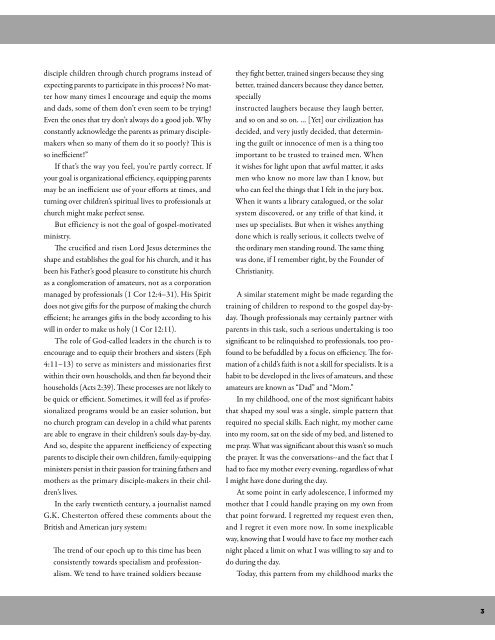here - The Southern Baptist Theological Seminary
here - The Southern Baptist Theological Seminary
here - The Southern Baptist Theological Seminary
You also want an ePaper? Increase the reach of your titles
YUMPU automatically turns print PDFs into web optimized ePapers that Google loves.
disciple children through church programs instead of<br />
expecting parents to participate in this process? No matter<br />
how many times I encourage and equip the moms<br />
and dads, some of them don’t even seem to be trying!<br />
Even the ones that try don’t always do a good job. Why<br />
constantly acknowledge the parents as primary disciplemakers<br />
when so many of them do it so poorly? This is<br />
so inefficient!”<br />
If that’s the way you feel, you’re partly correct. If<br />
your goal is organizational efficiency, equipping parents<br />
may be an inefficient use of your efforts at times, and<br />
turning over children’s spiritual lives to professionals at<br />
church might make perfect sense.<br />
But efficiency is not the goal of gospel-motivated<br />
ministry.<br />
<strong>The</strong> crucified and risen Lord Jesus determines the<br />
shape and establishes the goal for his church, and it has<br />
been his Father’s good pleasure to constitute his church<br />
as a conglomeration of amateurs, not as a corporation<br />
managed by professionals (1 Cor 12:4–31). His Spirit<br />
does not give gifts for the purpose of making the church<br />
efficient; he arranges gifts in the body according to his<br />
will in order to make us holy (1 Cor 12:11).<br />
<strong>The</strong> role of God-called leaders in the church is to<br />
encourage and to equip their brothers and sisters (Eph<br />
4:11–13) to serve as ministers and missionaries first<br />
within their own households, and then far beyond their<br />
households (Acts 2:39). <strong>The</strong>se processes are not likely to<br />
be quick or efficient. Sometimes, it will feel as if professionalized<br />
programs would be an easier solution, but<br />
no church program can develop in a child what parents<br />
are able to engrave in their children’s souls day-by-day.<br />
And so, despite the apparent inefficiency of expecting<br />
parents to disciple their own children, family-equipping<br />
ministers persist in their passion for training fathers and<br />
mothers as the primary disciple-makers in their children’s<br />
lives.<br />
In the early twentieth century, a journalist named<br />
G.K. Chesterton offered these comments about the<br />
British and American jury system:<br />
<strong>The</strong> trend of our epoch up to this time has been<br />
consistently towards specialism and professionalism.<br />
We tend to have trained soldiers because<br />
they fight better, trained singers because they sing<br />
better, trained dancers because they dance better,<br />
specially<br />
instructed laughers because they laugh better,<br />
and so on and so on. … [Yet] our civilization has<br />
decided, and very justly decided, that determining<br />
the guilt or innocence of men is a thing too<br />
important to be trusted to trained men. When<br />
it wishes for light upon that awful matter, it asks<br />
men who know no more law than I know, but<br />
who can feel the things that I felt in the jury box.<br />
When it wants a library catalogued, or the solar<br />
system discovered, or any trifle of that kind, it<br />
uses up specialists. But when it wishes anything<br />
done which is really serious, it collects twelve of<br />
the ordinary men standing round. <strong>The</strong> same thing<br />
was done, if I remember right, by the Founder of<br />
Christianity.<br />
A similar statement might be made regarding the<br />
training of children to respond to the gospel day-byday.<br />
Though professionals may certainly partner with<br />
parents in this task, such a serious undertaking is too<br />
significant to be relinquished to professionals, too profound<br />
to be befuddled by a focus on efficiency. <strong>The</strong> formation<br />
of a child’s faith is not a skill for specialists. It is a<br />
habit to be developed in the lives of amateurs, and these<br />
amateurs are known as “Dad” and “Mom.”<br />
In my childhood, one of the most significant habits<br />
that shaped my soul was a single, simple pattern that<br />
required no special skills. Each night, my mother came<br />
into my room, sat on the side of my bed, and listened to<br />
me pray. What was significant about this wasn’t so much<br />
the prayer. It was the conversations--and the fact that I<br />
had to face my mother every evening, regardless of what<br />
I might have done during the day.<br />
At some point in early adolescence, I informed my<br />
mother that I could handle praying on my own from<br />
that point forward. I regretted my request even then,<br />
and I regret it even more now. In some inexplicable<br />
way, knowing that I would have to face my mother each<br />
night placed a limit on what I was willing to say and to<br />
do during the day.<br />
Today, this pattern from my childhood marks the<br />
3
















